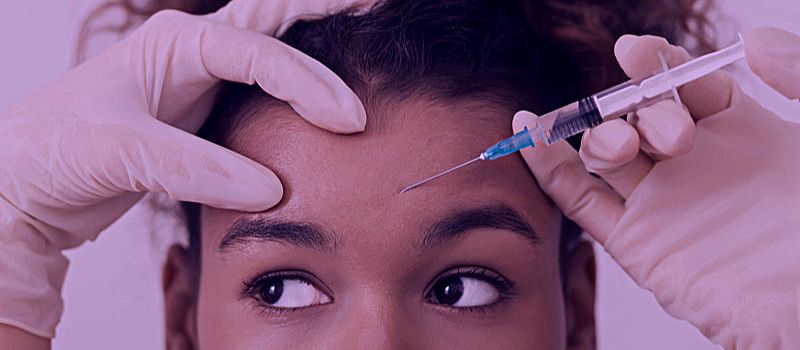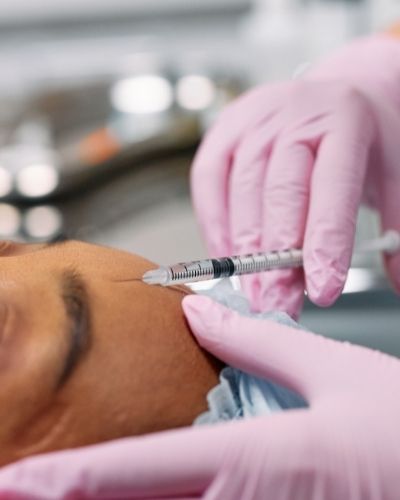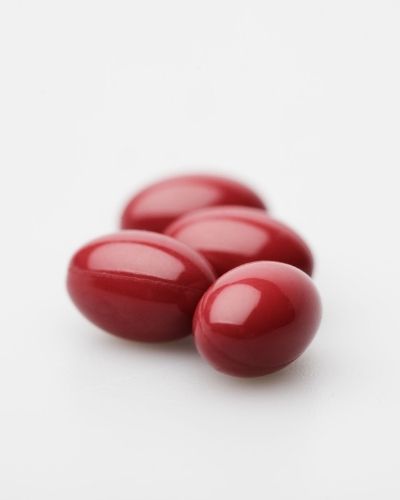Since both Accutane and Botox are considered controversial treatments by many, this question almost always arises by those considering getting some work done while undergoing an Accutane treatment.
This is fair, especially because Accutane can be pretty intense, and there’s not much you can do while you’re on it in terms of cosmetic treatments.
However, even though this may seem strange for many, yes, you can get Botox while on Accutane.
Accutane isn’t a contraindication to Botox, and there aren’t any serious side effects connected to combining both treatments.
Of course, as is the case with everything, both Botox and Accutane come with side effects on their own, so if you want to learn more about how they work and what they do, feel free to continue reading the article.

What is Botox and What Does It Do?

Botulinum Toxin Type A, commonly known by its brand name Botox, is a neurotoxin made from the bacterium Clostridium botulinum.
Botox is most frequently used for cosmetic purposes, such as reducing the appearance of wrinkles.
It can also be used for other purposes, such as treating migraines, excessive sweating, and muscular disorders such as muscle spasms.
Botox works by preventing the release of acetylcholine, the neurotransmitter responsible for signaling muscle movement.
As a result, nerve signals to muscles are blocked, causing temporary, localized muscle paralysis.
The paralyzed muscles keep the face from contracting in order to prevent wrinkles and lines caused by our everyday expressions.
However, because the effects of Botox wear off after about three to six months, “lasting” results are dependent on frequent and continual injections.
Additionally, lifestyle habits such as smoking, excessive drinking, facials that involve heavy pressure (such as facial massages), and unprotected sun exposure can break down and reverse the effects of Botox faster than usual.
On the other hand, having a good skincare routine that consists of plumping and anti-aging products such as retinol, hyaluronic acid, peptides, and of course, good sun protection can make Botox last longer.
How Does Accutane Work?

Accutane is the brand name for the medication known as isotretinoin, an oral medication used to treat severe acne on the face and body.
It is also commonly prescribed to people whose acne has resisted previous treatments, such as benzoyl peroxide, adapalene, and antibiotics, as well as those who are dealing with severe acne in larger areas such as the chest and back.
The exact mechanism of action is unknown; however, it’s been observed that Accutane inhibits the function of the oil-producing glands by reducing the gland’s size.
Once the gland’s size is reduced, the gland will then produce less oil.
And since excess oil is essentially food for the acne-causing bacteria that live on the skin, lack of it will cause the bacteria to become starved, thus minimizing proliferation and eventually minimizing acne, too.
Accutane is a very effective medication and has been noted to drastically diminish severe cases of acane in as little as six months.
However, despite its efficacy, Accutane is known to come with some unpleasant side effects, the most common ones including dry skin, chapped lips, and dry eyes.
Sometimes, people that are going through a long course of Accutane can experience joint pain, headaches, and hair loss, but these are rarer side effects that don’t happen to most people.
Another important thing to note about Accutane is that it’s also a teratogen, meaning it can cause birth defects in pregnant women.
For this reason, women who are taking Accutane must use two forms of contraception and take regular pregnancy tests to make sure they’re not pregnant while undergoing the medication and/or a couple of months after stopping it for precaution.
Botox and Accutane – Can They be Used Together Safely?
Now that we know more about both Botox and Accutane, let’s answer the question: can you get Botox while on Accutane?
The short answer is yes, you can.
Accutane isn’t a contraindication to Botox or any type of injections because Botox doesn’t actually do anything on the skin’s surface.
What it does is it works to paralyze the muscles underneath, so there’s no real interaction between the two.
What Are The Side Effects of Using Botox While on Accutane?

There are no recorded side effects of using Botox while on Accutane.
However, that doesn’t mean that you don’t have a chance of experiencing side effects from both agents.
Like with everything else, everyone reacts differently to cosmetic procedures, so even though both Botox and Accutane are approved as safe for use, there’s always the chance of experiencing some sort of a side effect.
Some most common side of using Botox include:
- Redness.
- Swelling.
- Bruising.
- Tenderness.
As for Accutane, the most common side effects include:
- Dry skin.
- Chapped lips.
- Dry eyes.
- Increased sun sensitivity.
- Headaches.
- Hair loss.
What Facial Treatments Should You Avoid While on Accutane?
While taking Accutane, you shouldn’t be doing facial treatments such as chemical peels, microneedling, or laser resurfacing.
The reason for this is that these treatments actually work on the skin’s surface, and due to the skin being dry and vulnerable from Accutane, they can cause quite a bit of damage, or in the best-case scenario, the healing process will likely be prolonged, which will make your skin vulnerable and prone to damage for a prolonged period of time.
You should also give your skin time to heal and recuperate after an Accutane treatment, and you should consider waiting for at least 2-3 months before doing a more intense treatment like the ones mentioned above.

My name is Simone and I am a certified skin specialist. I created this website to teach my readers how to take great care of their skin and I also like to occasionally share my honest opinions on skincare products I’ve tried. You can learn more about me here.
